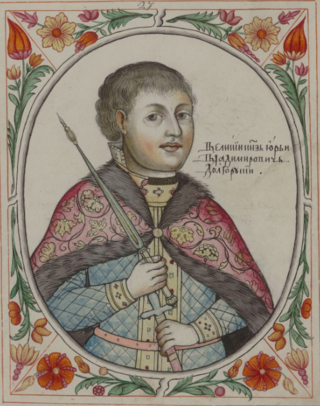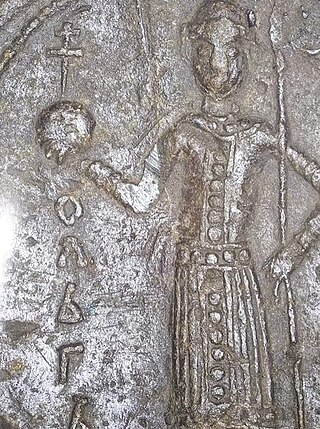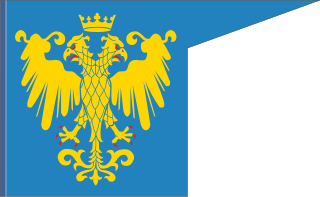
The Primary Chronicle, shortened from the common Russian Primary Chronicle, is a chronicle of Kievan Rus' from about 850 to 1110. It is believed to have been originally compiled in or near Kiev in the 1110s. Tradition ascribed its compilation to the monk Nestor beginning in the 12th century, but this is no longer believed to have been the case.
The Grand Prince of Kiev was the title of the monarch of Kievan Rus', residing in Kiev from the 10th to 13th centuries. In the 13th century, Kiev became an appanage principality first of the grand prince of Vladimir and the Mongol Golden Horde governors, and later was taken over by the Grand Duchy of Lithuania.

Yuri I Vladimirovich, commonly known as Yuri Dolgorukiy or the Long Arm, was a Monomakhovichi prince of Rostov and Suzdal, acquiring the name Suzdalia during his reign. Noted for successfully curbing the privileges of the landowning boyar class in Rostov-Suzdal and his ambitious building programme, Yuri transformed this principality into the independent power that would evolve into early modern Muscovy. Yuri Dolgorukiy was the progenitor of the Yurievichi, a branch of the Monomakhovichi.

Oleg Svyatoslavich was a prince from Kievan Rus' whose equivocal adventures ignited political unrest in the country at the turn of the 11th and 12th centuries. He reigned as Prince of Chernigov from 1094 to 1097, and as Prince of Novgorod-Seversk from 1097 to 1115. He was the progenitor of the Olgovichi family.
Sveneld, is a semi-legendary 10th-century Varangian warlord in the service of Sviatoslav I and his family. Most of the information about Sveneld is scarce. He is described as a rich man and a voevoda of Kievan Rus', but his relation to the reigning Rurikid princes, if it existed, has not been positively established.

Boris Vyacheslavich was Prince of Chernigov for eight days in 1077. He was the son of Vyacheslav Yaroslavich, Prince of Smolensk. Following his father's death in 1057, the child Boris was debarred from his inheritance. He died fighting against his uncles—Vsevolod Yaroslavich, Prince of Chernigov and Izyaslav Yaroslavich, Grand Prince of Kiev—on 3 October 1078.
Boniak, Bonyak or Maniac, also known as Boniak the Mangy, was "one of the most prominent Cuman chieftains" in the late 11th century and the early 12th century. He headed a powerful Cuman tribe or clan that inhabited the steppes to west of the Dnieper River. He supported the Byzantines against the Pechenegs in the Battle of Levounion in 1091. He defeated Coloman, King of Hungary in 1097 or 1099.
The Battle of Listven (1024) was part of the aftermath of the Kievan succession crisis of 1015–1019 following the death of Vladimir the Great (Volodymyr) in 1015. It was fought between his sons Mstislav of Chernigov and Kievan forces supporting Yaroslav the Wise; Mstislav defeated Yaroslav. The battle is mainly known from the account written under the year 6532 (1024) in the Primary Chronicle, completed about 90 years later. According to that legendary narrative, the battle took place at night during a thunderstorm.
The Prince of Pereyaslavl was the ruler of the Principality of Pereyaslavl, a lordship based on the city of Pereyaslavl on the Trubizh River, and straddling extensive territory to the east in what are now parts of Ukraine. It was situated on the southern frontier of Kievan Rus' and bordered the steppe.

Yaropolk Iziaslavich was Prince of Turov and Prince of Volhynia from 1078 until his death.

The Principality of Peremyshl was a medieval petty principality centred on Peremyshl in the Cherven lands.

The Council of Liubech was one of the best documented princely meetings in Kievan Rus' that took place in Liubech on October 19, 1097. The council ended the Chernihiv war of succession (1093–1097) between Sviatopolk II of Kiev, Vladimir II Monomakh and Oleg I of Chernigov who fought for the heritage of his father Sviatoslav II of Kiev.
Davyd Sviatoslavich was the ruler of Murom and Chernigov.
Roman Svyatoslavich or Roman the Handsome was prince of Tmutarakan in Kievan Rus'. The starting year of his reign is uncertain, but he reigned his principality from around 1073 or 1077. His former allies, the Cumans killed him after their unsuccessful joint campaign against his uncle, Vsevolod I of Kiev.
Iaroslav Sviatopolkovich, also known as Iaroslav or Yaroslav Sviatopolchich, was Prince of Volhynia from 1100 to 1118.

The Kievan succession crisis of 1015–1019, also known as the Feud of the Volodimerovichi or the Internecine war in Rus', was a war of succession in Kievan Rus' caused by the death of Volodimer I of Kiev in 1015. Several of his sons claimed the throne, and began fighting and killing each other, until eventually Yaroslav emerged victorious in 1019.

Predslava Volodimerovna was a princess from Kievan Rus', daughter of Volodimer' I of Kiev and Rogned', concubine of Bolesław I the Brave, and sister of Yaroslav the Wise. She is one of the few named women who appear in the Primary Chronicle (PVL).

The Battle of the Alta River was a battle that took place on 24 July 1019 between the troops of the Novgorodian prince Yaroslav "the Wise" Volodimerovich and the army of his brother, prince Sviatopolk I of Kiev, who was supported by the Pechenegs. It was part of the Kievan succession crisis of 1015–1019.

The Feud of the Sviatoslavichi was a war of succession in Kievan Rus' in the late 970s, between the sons of the Kievan prince Sviatoslav I Igorevich, for 'eldership' after the death of their father.

The Council of Dolobsk is one of the significant stages in the attempts of the princes of Kievan Rus' to stop their internal quarrels, and unite their efforts in the face of the Cuman (Polovtsi) threat. According to the Primary Chronicle (PVL), it took place in early 1103 (6611) at the Lake of Dolobsk, somewhere near Kiev. The Hypatian Codex continuation of the PVL reports a very similar Council of Dolobsk between the same people, with only slight differences in wording, but taking place in the year 1111 (6619) instead; this might be an accidental duplication of the earlier narrative sub anno 1103 (6611).












